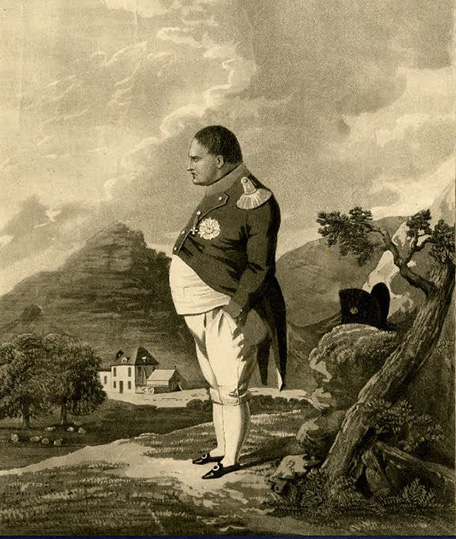Five years into his six-year exile on St. Helena, Napoleon was pale, tired-looking, and fat, though his face showed no fatigue or illness. Still, after a ten-mile journey on horseback (on hilly terrain), he uncharacteristically stopped for a social visit at Mount Pleasant, the home of William Doveton. Because he arrived in the morning and remained for an alfresco breakfast, the event is called a picnic by William Forsyth and Hudson Lowe in their History of the Captivity of Napoleon at St. Helena (1853).
The elaborate picnic prepared by Napoleon’s staff was served on the lawn. Louis-Étienne St. Denis, Napoleon’s valet, recollects that he was a frugal eater who preferred boiled meats. But on occasion, Forsyth and Hudson describe hampers packed with cold pie, potted meat, cold turkey, curried fowl, ham (or pork), dates, almonds (a favorite), oranges, salad, and champagne; the Doveton’s supplied coffee and a local beverage called “Mount Pleasant water.” Napoleon sipped the champagne, probably his own, and passed on the coffee.
The gathering was pleasant, but the conversation was limited: Napoleon bantered affably in French and the Dovetons in English. What was not foreseen was that October 4, 1820, was Napoleon’s final social outing, and after returning to Longwood, his health continued to decline until he died of stomach cancer in May 1821.
Featured Image: After Henry Duncan Dodgin. Napoleon in 1820. Aquatint on china collé drawn from life. Longwood, Napoleon’s estate, is in the background. London: British Museum. Dodgin was a captain of an English regiment stationed on St. Helena. Napoleon’s valet said he was a frugal eater, but after five years of exile on St. Helena, his face was fat, and his figure plump. Henry Dodgin’s contemporary sketch of the great man suggests a penguin. But it’s not a caricature, and this is how Napoleon looked on October 4, 1820, when he set out for a picnic.
See William Forsyth and Hudson Lowe. History of the Captivity of Napoleon at St. Helena. Vol. 3. London: John Murray, 1853; Louis-Étienne St. Denis. Napoleon from the Tuileries to St. Helena: Personal Recollections of the Emperor’s Second Mameluke and Valet. Translated by Frank Hunter Potter. New York: Harper & Bros., 1922. [Mameluke means a bodyguard.]

